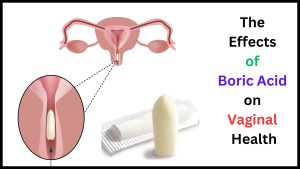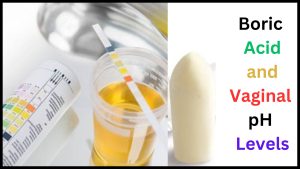
Boric Acid And Vaginal Health – Have you heard about the amazing benefits of boric acid for vaginal health?
It may sound unusual, but this natural compound has been gaining recognition for its incredible potential to restore balance and promote overall well-being in the intimate area.
From alleviating discomfort to combating recurrent infections, boric acid has shown promising results.
In this article, we will explore the various ways boric acid can benefit vaginal health and provide insights on how to incorporate it into your routine.
So, let’s dive into the world of boric acid and unlock the secrets to a healthier, happier intimate area.
Table of Contents
Boric Acid And Vaginal Health: Benefits & How it restores pH
What is Boric Acid?
Boric acid is a white, crystalline compound that is commonly used for various purposes, including maintaining vaginal health.
It is derived from boron, a naturally occurring element, and is known for its antifungal, antibacterial, and pH-balancing properties.
In the context of vaginal health, boric acid has been found to be particularly effective in treating yeast infections, balancing vaginal pH levels, addressing bacterial vaginosis, and relieving vaginal itching and odor.

 Chemical Composition of Boric Acid
Chemical Composition of Boric Acid
Boric acid, also known chemically as H3BO3, is composed of boron, oxygen, and hydrogen atoms.
It is classified as a weak acid, which means it does not ionize fully in aqueous solutions.
The molecular structure of boric acid allows it to easily release hydrogen ions, which makes it effective in maintaining the acidic environment necessary for vaginal health.
Common Uses of Boric Acid
Apart from its application in vaginal health, boric acid has a wide range of uses in various industries.
It is commonly used as a mild antiseptic, disinfectant, and pest control agent.
In the medical field, boric acid is also utilized as an ophthalmic solution to treat eye infections and as an antacid to relieve acidic stomach conditions.
Additionally, it can be found in some cosmetics and skincare products due to its soothing and antibacterial properties.
Safety Considerations for Using Boric Acid
While boric acid can be highly beneficial for vaginal health, it is essential to use it with caution and under the guidance of a healthcare professional.
It is crucial to ensure that the boric acid used is of pharmaceutical-grade quality to avoid impurities that may cause irritation or harm.
Additionally, it is important to follow the recommended dosage and usage instructions provided by healthcare professionals to minimize the risk of adverse effects.
If any discomfort or unusual symptoms occur during treatment, it is advisable to discontinue use and seek medical attention promptly.

The Effects of Boric Acid on Vaginal Health
The use of boric acid for vaginal health has gained popularity due to its effectiveness in addressing various common issues.
It has been found to play a crucial role in treating yeast infections, balancing vaginal pH levels, addressing bacterial vaginosis, and providing relief from vaginal itching and odor.
Let’s explore each of these benefits in detail.
Why Boric Acid is Used for Vaginal Health
Boric acid is used for vaginal health primarily due to its antifungal and antibacterial properties.
The acidic nature of boric acid creates an environment that inhibits the growth of harmful microorganisms such as Candida, the fungus responsible for yeast infections, and certain bacteria associated with bacterial vaginosis.
Additionally, boric acid helps restore the natural pH balance of the vagina, which is essential for maintaining optimal vaginal health.
Treatment of Yeast Infections
Yeast infections are a common vaginal condition caused by an overgrowth of Candida.
The symptoms can be uncomfortable and disruptive to daily life.
While there are various over-the-counter antifungal treatments available, boric acid has been found to be effective in cases where conventional treatments have failed.
Boric acid suppositories can be used to directly target and eliminate the infection, providing relief from symptoms such as itching, burning, and abnormal discharge.
Balancing Vaginal pH Levels
The vaginal pH level refers to the acidity or alkalinity of the vaginal environment.
A healthy vaginal pH level is typically slightly acidic, ranging between 3.8 and 4.5.
Factors such as hormonal changes, certain medications, and sexual activity can disrupt the natural pH balance, leading to an increased risk of infections and discomfort.
Boric acid can help restore the vaginal pH to its optimal range, creating an inhospitable environment for harmful bacteria and fungi.
Addressing Bacterial Vaginosis
Bacterial vaginosis (BV) is a common vaginal infection caused by an imbalance in the naturally occurring bacteria in the vagina.
It can result in symptoms such as abnormal discharge with a fishy odor, itching, and irritation.
Boric acid has been found to be effective in treating BV by suppressing the growth of the bacteria associated with the condition.
It helps restore the natural balance of bacteria in the vagina, relieving symptoms and promoting overall vaginal health.
Relief from Vaginal Itching and Odor
Vaginal itching and odor can be extremely uncomfortable and distressing.
They can be caused by a variety of factors, including infections, hormonal changes, poor hygiene, or imbalanced pH levels.
Boric acid has been found to alleviate these symptoms by reducing inflammation, addressing any underlying infections, and restoring the vaginal pH balance.
It can provide significant relief from itching and help eliminate unpleasant odors, improving overall vaginal comfort and confidence.

Using Boric Acid for Yeast Infections
Yeast infections are a prevalent issue among women, and finding effective treatment options is crucial for alleviating symptoms and preventing recurrence.
Boric acid has emerged as an alternative treatment for yeast infections, especially in cases where conventional antifungal medications fail to provide relief.
How Boric Acid Helps with Yeast Infections
Boric acid is effective against yeast infections due to its antifungal properties.
It directly targets the Candida fungus, inhibiting its growth and ultimately killing the yeast cells.
Unlike conventional antifungal treatments that primarily focus on symptom relief, boric acid provides a more comprehensive approach by addressing the underlying cause of the infection.
Preparing and Using Boric Acid Suppositories
Boric acid suppositories are the most common form of treatment for yeast infections.
They are typically prepared by mixing pharmaceutical-grade boric acid powder with a gelatin capsule or using specially formulated commercially available suppositories.
It is important to follow the instructions provided by healthcare professionals or the product packaging carefully to ensure proper preparation and usage.
To use boric acid suppositories, it is recommended to insert one suppository into the vagina before bedtime.
The suppository should be inserted as deeply as possible to ensure proper distribution.
It is advisable to wear a panty liner during treatment to protect clothing and avoid potential leakage.
The suppositories are typically used for a specified duration, which may range from a few days to several weeks, depending on the severity of the infection and healthcare professional’s guidance.
Duration of Treatment
The duration of boric acid treatment for yeast infections may vary depending on the severity of the infection and individual factors.
It is important to consult with a healthcare professional to determine the appropriate treatment duration.
In some cases, a short-term treatment of a few days may be sufficient to alleviate symptoms and resolve the infection.
However, for recurrent or more severe infections, a longer-term treatment plan may be recommended.
Benefits and Potential Side Effects
The use of boric acid for yeast infections offers several potential benefits.
It provides an alternative treatment option for individuals who do not respond well to traditional antifungal medications.
Additionally, boric acid has a lower risk of contributing to antibiotic resistance, which is a growing concern in the medical field.
However, it is important to note that boric acid may not be suitable for everyone, and there are some potential side effects associated with its usage.
Some common side effects of using boric acid suppositories for yeast infections include mild vaginal burning or irritation.
These side effects are usually temporary and resolve on their own.
However, if the discomfort persists or worsens, it is important to discontinue use and consult with a healthcare professional.
In rare cases, boric acid can cause more severe adverse reactions, such as allergic reactions or chemical burns.
Immediate medical attention should be sought if any unusual symptoms or severe reactions occur.

Boric Acid and Vaginal pH Levels
Maintaining the proper vaginal pH level is crucial for overall vaginal health and preventing various infections and discomfort.
Boric acid has been found to be effective in balancing vaginal pH levels, promoting a healthy environment for the vagina.
Understanding Vaginal pH Levels
The vaginal pH level refers to the acidity or alkalinity of the vagina.
A healthy vagina typically has a pH level that is slightly acidic, ranging between 3.8 and 4.5.
This acidity is essential for maintaining the natural balance of the vaginal flora, keeping harmful bacteria and fungi in check.
However, various factors such as hormonal changes, certain medications, and sexual activity can disrupt the vaginal pH balance, leading to an increased risk of infections and discomfort.
How Boric Acid Can Help Balance pH
Boric acid is an effective tool for balancing vaginal pH levels due to its acidic properties.
When used in the vagina, boric acid helps restore the optimal pH range by neutralizing any excess alkalinity.
This helps create an acidic environment that is unfavorable for the growth of harmful bacteria and fungi, promoting a healthy vaginal ecosystem.
Proper Usage and Precautions
Using boric acid to balance vaginal pH levels should be done with caution and under the guidance of a healthcare professional.
It is important to ensure that pharmaceutical-grade boric acid is used to minimize the risk of impurities.
Healthcare professionals can provide specific instructions on the recommended dosage and usage frequency based on individual needs.
It is crucial to follow these instructions carefully and avoid using boric acid for an extended period without medical supervision.
As with any vaginal treatment, it is essential to monitor for any signs of discomfort or adverse reactions.
If any irritation, burning, or unusual symptoms occur, it is advisable to discontinue use and seek medical attention.
Additionally, it is important to avoid using boric acid in conjunction with other vaginal products or treatments without consulting a healthcare professional, as this may disrupt the effectiveness of the treatment or lead to potential interactions.

Addressing Bacterial Vaginosis with Boric Acid
Bacterial vaginosis (BV) is a common vaginal infection characterized by an imbalance in the naturally occurring bacteria in the vagina.
While antibiotics are the standard treatment for BV, some women may seek alternative treatment options due to recurrent infections or personal preferences.
Boric acid has been found to be effective in addressing bacterial vaginosis, providing a potential alternative for those seeking non-antibiotic options.
Overview of Bacterial Vaginosis
Bacterial vaginosis is caused by an overgrowth of anaerobic bacteria in the vagina, which disrupts the balance of bacteria.
This condition is characterized by symptoms such as a thin, grayish-white discharge with a fishy odor, itching, and irritation.
BV is not typically associated with significant inflammation or discomfort, but it can increase the risk of other complications such as pelvic inflammatory disease if left untreated.
Efficiency of Boric Acid in Treating Bacterial Vaginosis
Boric acid has shown promising results in treating bacterial vaginosis by altering the vaginal pH and suppressing the growth of harmful bacteria associated with the condition.
It can help restore the natural balance of bacteria in the vagina, alleviating symptoms and promoting a healthy vaginal environment.
However, it is important to note that boric acid should be used as an alternative treatment under the guidance of a healthcare professional and in cases where conventional antibiotic treatments have been unsuccessful or undesirable.
Methods of Application and Recommended Dosage
When using boric acid for bacterial vaginosis, it is typically administered in the form of suppositories.
The suppositories are inserted into the vagina, allowing the boric acid to directly target the infection and exert its antifungal and antibacterial properties.
Healthcare professionals can provide guidance on the recommended dosage and frequency of use based on individual needs.
It is essential to properly prepare and handle the boric acid suppositories to ensure safety and effectiveness.
Following the instructions provided by healthcare professionals or the product packaging is crucial to ensure proper usage.
It is also recommended to wear a panty liner during treatment to protect clothing and minimize potential leakage.
Safety Considerations and Potential Risks
While boric acid can be effective in treating bacterial vaginosis, it is important to use it with caution and under the supervision of a healthcare professional.
Some potential risks and considerations to be aware of include:
1. Quality of the boric acid: Ensure that pharmaceutical-grade boric acid is used to minimize the risk of impurities that may cause irritation or harm.
2. Dosage and duration: Follow the recommended dosage and duration of treatment provided by healthcare professionals.
Overuse or prolonged use of boric acid may lead to adverse effects.
3. Discomfort or adverse reactions: Monitor for any signs of discomfort, burning, or unusual symptoms.
If any adverse reactions occur, discontinue use and seek medical attention promptly.
4. Safety during pregnancy: Pregnant individuals should exercise caution when using boric acid, as its safety during pregnancy has not been extensively studied.
It is important to consult with a healthcare professional before using boric acid for vaginal health during pregnancy.
5. Interactions with other medications: Some medications or treatments may interact with boric acid, affecting its effectiveness or increasing the risk of adverse effects.
It is crucial to disclose all current medications or treatments to healthcare professionals before using boric acid.
It is important to note that individual responses to boric acid treatment may vary.
Some women may experience significant improvement in symptoms, while others may find little to no relief.
Consulting with a healthcare professional is critical to assess individual suitability and address any concerns or questions.
Benefits of Boric Acid for Vaginal Itching and Odor
Vaginal itching and odor can be distressing and affect one’s quality of life and self-confidence.
While there can be various causes for these symptoms, boric acid has been found to provide relief by addressing underlying factors and promoting overall vaginal health.
Causes of Vaginal Itching and Odor
Vaginal itching and odor can be caused by several factors, including:
1. Infections: Yeast infections, bacterial vaginosis, or sexually transmitted infections can lead to itching and unpleasant odors.
2. Hormonal changes: Fluctuations in hormone levels, such as those experienced during menstruation or menopause, can lead to vaginal discomfort and odor.
3. Poor hygiene: Inadequate personal hygiene practices can contribute to vaginal itching and odor.
4. Imbalanced pH levels: When the natural pH balance of the vagina is disrupted, it can result in itching and odor.
How Boric Acid Alleviates These Symptoms
Boric acid can help alleviate vaginal itching and odor by addressing the underlying causes.
As an antifungal and antibacterial agent, boric acid directly targets harmful microorganisms, such as fungi and certain bacteria, that can contribute to these symptoms.
By restoring the natural pH balance of the vagina, boric acid creates an environment that promotes the growth of beneficial bacteria and discourages the growth of harmful microorganisms.
This helps alleviate itching, reduce inflammation, and eliminate unpleasant odors.
Application Methods for Relieving Itching and Odor
To use boric acid for relieving itching and odor, it is typically administered in the form of suppositories.
The suppositories are inserted into the vagina, allowing the boric acid to reach the affected area and exert its beneficial effects.
Healthcare professionals can provide specific instructions on the recommended dosage, frequency, and duration of use based on individual needs.
It is important to note that boric acid should not be used as a standalone treatment for persistent itching and odor.
It is essential to identify and address the underlying cause of these symptoms, such as infections or hormonal imbalances.
Healthcare professionals can help determine the appropriate course of treatment and provide guidance on incorporating boric acid as part of a comprehensive approach to vaginal health.
Precautions and Possible Adverse Effects
While boric acid can be effective in relieving itching and odor, it is important to use it with caution and under the guidance of a healthcare professional.
Some precautions and possible adverse effects to be aware of include:
1. Quality of the boric acid: Ensure that pharmaceutical-grade boric acid is used to minimize the risk of impurities that may cause irritation or harm.
2. Follow recommended usage guidelines: It is crucial to follow the recommended dosage, frequency, and duration of use provided by healthcare professionals.
Overuse or prolonged use of boric acid may lead to adverse effects.
3. Monitor for adverse reactions: It is essential to monitor for any signs of discomfort, burning, or unusual symptoms.
If any adverse reactions occur, discontinue use and seek medical attention promptly.
4. Consultation with healthcare professionals: It is advisable to consult with a healthcare professional before using boric acid for vaginal itching and odor, especially if the symptoms persist or worsen.
In addition to its primary applications in treating yeast infections, balancing vaginal pH, and addressing bacterial vaginosis, boric acid has potential alternative uses to maintain overall vaginal health.
Preventative Uses to Maintain Vaginal Health
Boric acid can be used preventatively to maintain optimal vaginal health and prevent certain infections and discomfort.
Regular use of boric acid suppositories or a prescribed regimen can help balance vaginal pH levels, discourage the growth of harmful microorganisms, and support the growth of beneficial bacteria.
By maintaining a healthy vaginal environment, individuals may be able to reduce the risk of recurrent infections and promote general vaginal well-being.
Supporting Research and Anecdotal Evidence
While boric acid has been studied and proven effective for specific vaginal health issues, such as yeast infections and bacterial vaginosis, further research is still needed to explore its potential benefits beyond these common issues.
Preliminary studies and anecdotal evidence suggest that boric acid may also have a positive impact on conditions such as vaginal dryness, certain sexually transmitted infections, and postmenopausal vaginal discomfort.
However, more research is required to establish its efficacy and safety in these areas.
Exploring Potential Benefits Beyond Common Issues
Emerging studies and anecdotal evidence have sparked interest in exploring the potential benefits of boric acid for various vaginal health concerns.
Some ongoing research aims to investigate its effectiveness in treating conditions such as recurrent urinary tract infections, interstitial cystitis, and vulvodynia.
While these studies are still in progress, they indicate the potential versatility of boric acid in addressing a range of vaginal health issues.
However, it is important to note that individual responses to boric acid may vary, and it should always be used under the guidance of a healthcare professional.

Safety Precautions and Considerations
While boric acid can provide significant benefits for vaginal health, it is important to use it with caution and follow appropriate safety precautions.
Some key considerations to keep in mind when using boric acid include:
Potential Allergic Reactions or Sensitivity
Individuals may have varying degrees of sensitivity or allergies to boric acid.
It is crucial to conduct a patch test or seek guidance from a healthcare professional before using boric acid for vaginal health.
This helps identify any potential allergic reactions or sensitivity and allows for appropriate adjustments in the treatment plan.
Recommended Boric Acid Concentration
Following the recommended concentration of boric acid is important to ensure safety and effectiveness.
Higher concentrations may increase the risk of adverse effects, while lower concentrations may not provide the desired therapeutic benefits.
Healthcare professionals can provide specific recommendations based on individual needs and the severity of the condition being treated.
Usage Instructions and Guidelines
Proper usage instructions and guidelines should be followed to ensure the desired results and minimize potential risks.
It is important to carefully read the product packaging or consult with healthcare professionals for detailed instructions on preparing and using boric acid suppositories.
Strict adherence to these guidelines is crucial to maintain safety and optimize treatment outcomes.
Consultation with Healthcare Professionals
Before starting boric acid treatment for vaginal health, it is advisable to consult with a healthcare professional.
They can assess individual suitability for boric acid usage, provide tailored recommendations, and address any concerns or questions.
Healthcare professionals can also monitor treatment progress and make necessary adjustments as needed.

Possible Side Effects and Risks
While boric acid can be highly beneficial for vaginal health, it is important to be aware of possible side effects and risks.
Understanding these potential risks can help individuals make informed decisions and seek appropriate medical attention if needed.
Common Side Effects of Boric Acid Usage
Some common side effects of using boric acid for vaginal health include:
1. Mild vaginal burning or irritation: This is a temporary side effect that usually resolves on its own.
However, if the discomfort persists or worsens, it is important to discontinue use and seek medical attention.
2. Increased vaginal discharge: Boric acid may cause an increase in vaginal discharge for some individuals.
This side effect is generally temporary and not a cause for concern.
Serious Risks and Precautions to be Aware of
While rare, there are some potentially serious risks associated with boric acid usage.
These risks include:
1. Allergic reactions: Some individuals may develop allergic reactions to boric acid, leading to symptoms such as severe itching, rash, swelling, or difficulty breathing.
Immediate medical attention should be sought if any allergic reactions occur.
2. Chemical burns: In rare cases, boric acid can cause chemical burns in the vagina, leading to severe pain, blistering, or tissue damage.
If any signs of chemical burns are observed, immediate medical attention should be sought.
Pregnancy and Boric Acid
The safety of using boric acid during pregnancy has not been extensively studied.
As a precautionary measure, it is generally recommended to avoid using boric acid for vaginal health during pregnancy.
Pregnant individuals should consult with a healthcare professional for guidance on safe and appropriate treatment options.
Interactions with Other Medications or Treatments
Boric acid may interact with certain medications or treatments, affecting its effectiveness or increasing the risk of adverse effects.
It is important to disclose all current medications or treatments to healthcare professionals before using boric acid for vaginal health.
This allows for comprehensive assessment and appropriate adjustments to the treatment plan if needed.

Conclusion
Boric acid has emerged as a versatile and effective tool for maintaining vaginal health.
It offers various benefits, including the treatment of yeast infections, balancing vaginal pH levels, addressing bacterial vaginosis, and relieving vaginal itching and odor.
However, it is important to use boric acid with caution and under the guidance of a healthcare professional.
Following proper usage instructions, monitoring for any adverse reactions, and seeking medical attention when needed are crucial steps in ensuring its safe and effective use.
Further research is needed to explore the potential benefits of boric acid beyond common issues and to establish its efficacy and safety in various vaginal health concerns.
With proper usage and medical guidance, boric acid can provide relief and support the overall well-being of the vagina.
Question & Answer:
Does Boric Acid Increase Wetness?
A common concern among women considering the use of boric acid is whether it will increase vaginal wetness.
The answer to this question is no.
Boric acid does not increase wetness in the vagina.
Instead, it helps restore the natural pH balance of the vagina, which can alleviate symptoms such as dryness or excessive moisture.
The balanced pH environment created by boric acid promotes the growth of healthy bacteria and discourages the overgrowth of harmful bacteria, thus contributing to overall vaginal health.
How Often Should a Woman Use Boric Acid?
The frequency of boric acid use depends on the individual’s specific needs and the recommendation of their healthcare provider.
Generally, boric acid is used for a short duration, ranging from a few days to several weeks.
It is important to follow the recommended dosage and duration provided by your healthcare provider to achieve the desired results.
When Should You Not Use Boric Acid?
While boric acid can be an effective treatment for various vaginal conditions, there are certain situations in which its use should be avoided.
Pregnant women should not use boric acid as it may pose a risk to the developing fetus.
Additionally, individuals with kidney or liver problems, as well as those with an allergy to boric acid, should refrain from using it.
If you have any concerns or underlying health conditions, it is always best to consult with your healthcare provider before incorporating boric acid into your vaginal health routine.
Benefits of Boric Acid in the Body
Beyond its effect on vaginal health, boric acid has been found to offer several benefits to the body.
It exhibits both antibacterial and antifungal properties, making it an effective treatment for various infections.
Additionally, boric acid can help alleviate symptoms associated with certain skin conditions, such as eczema or psoriasis.
However, it is important to note that the use of boric acid for these purposes should be done under the guidance of a healthcare professional.
Does Boric Acid Affect Fibroids?
There is no significant evidence to suggest that boric acid directly affects fibroids.
Fibroids are non-cancerous growths that develop in the uterus and are not related to the use of boric acid.
If you have concerns about fibroids or any other uterine condition, it is advisable to consult with your healthcare provider for proper diagnosis and treatment options.
What Happens After Taking Boric Acid?
After inserting boric acid into the vagina, it gradually dissolves and helps restore the pH balance.
This can lead to relief from symptoms such as itching, burning, or unusual discharge.
However, it is important to note that the full effects of boric acid may take some time to be noticeable.
It is recommended to complete the full course of treatment as prescribed by your healthcare provider to ensure optimal results.
Does Boric Acid Affect Fertility?
The use of boric acid does not have a direct impact on fertility.
However, it is crucial to follow the recommended dosage and duration of use to minimize any potential risks.
If you are trying to conceive or have concerns about fertility, it is advisable to consult with your healthcare provider for personalized guidance and recommendations.
Does Boric Acid Cure Infection Completely?
Boric acid has been shown to be effective in treating certain vaginal infections, such as yeast infections or bacterial vaginosis.
However, it is important to note that boric acid may not completely cure the underlying infection.
It can help alleviate symptoms and restore the pH balance of the vagina, but it is essential to identify and address the root cause of the infection for long-term resolution.
Consult with your healthcare provider for a proper diagnosis and guidance on treating your specific infection.
What Not to Do After Inserting Boric Acid?
After inserting boric acid, it is important to follow certain precautions to maximize its effectiveness and minimize potential irritation.
Avoid sexual intercourse, tampon usage, or douching immediately after using boric acid.
Additionally, maintaining good hygiene, wearing breathable clothing, and practicing safe sex can contribute to overall vaginal health and support the effectiveness of boric acid.
Can Boric Acid Affect Your Period?
There is no evidence to suggest that boric acid affects the regularity or duration of menstrual periods.
However, if you experience any changes in your menstrual cycle or have concerns, it is advisable to consult with your healthcare provider for further evaluation.
How Long Does It Take Boric Acid to Clear Yeast Infection?
The duration for boric acid to clear a yeast infection may vary depending on the severity of the infection and individual response.
In general, relief from symptoms can be observed within a few days of starting the treatment.
However, it is important to complete the full course of treatment as prescribed by your healthcare provider, even if symptoms improve, to ensure complete eradication of the infection.
Major Side Effects of Boric Acid
While boric acid is generally safe to use, there are potential side effects that should be considered.
These side effects may include vaginal irritation, burning, or discharge.
If you experience any unusual or severe side effects, it is important to discontinue the use of boric acid and seek medical attention.
Additionally, it is important to keep boric acid out of reach of children and avoid oral ingestion, as it can be toxic if ingested in large quantities.
Can Boric Acid Be Used Every Day?
The frequency of boric acid usage should be determined by your healthcare provider.
In some cases, boric acid may be recommended for daily or intermittent use for a specific duration.
However, it is important to follow the recommended usage guidelines provided by your healthcare provider to ensure its safe and effective use.
Can Boric Acid Cure Staphylococcus?
Boric acid is not considered a primary treatment for Staphylococcus infections.
Staphylococcus is a type of bacteria that can cause various infections, including skin infections and urinary tract infections.
If you suspect a Staphylococcus infection, it is important to seek medical evaluation for proper diagnosis and treatment options.
Boric acid may be used as part of a comprehensive treatment plan, but it should not be relied upon as the sole method of treatment.
It is important to use it under the guidance of a healthcare provider and follow the recommended dosage and duration of use.
Remember to consult with your healthcare provider for personalized advice and recommendations regarding your specific vaginal health needs.


